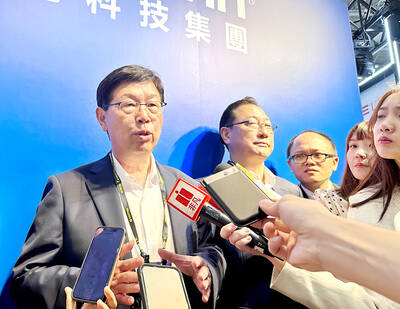After reaching record highs in June and July, followed by a low last month, consumer confidence in Taiwan was almost flat this month, a survey released yesterday showed.
The latest consumer confidence index (CCI) compiled by the Research Center for Taiwan Economic Development at National Central University rose 0.10 points to 83.16 this month from 83.06 last month.
All six sub-indices showed minimal changes this month, within a margin of error of 2 percentage points.
Center director Dachrahn Wu (吳大任) said this month’s readings indicated that “the overall economic fundamentals are relatively quite good.”
Three of the sub-indices were higher this month than last month, with confidence in the job market seeing the biggest increase of 1.58 points, rising to 109.95.
Confidence in family finances rose 0.55 points to 76.85, while confidence in the domestic economy climbed 0.35 points to 77.75.
Meanwhile, confidence in the stock market’s prospects and domestic consumer prices both fell — the former by 0.7 points to 83.4 and the latter 0.45 points to 44.8.
The sub-index of confidence in durable goods purchases was also lower, falling 0.75 points, but remained above the level of optimism at 106.2. Scores of more than 100 generally indicate optimism, while those under 100 signal pessimism.
The telephone survey was conducted from Aug. 19 to Aug. 21.

Taiwan Transport and Storage Corp (TTS, 台灣通運倉儲) yesterday unveiled its first electric tractor unit — manufactured by Volvo Trucks — in a ceremony in Taipei, and said the unit would soon be used to transport cement produced by Taiwan Cement Corp (TCC, 台灣水泥). Both TTS and TCC belong to TCC International Holdings Ltd (台泥國際集團). With the electric tractor unit, the Taipei-based cement firm would become the first in Taiwan to use electric vehicles to transport construction materials. TTS chairman Koo Kung-yi (辜公怡), Volvo Trucks vice president of sales and marketing Johan Selven, TCC president Roman Cheng (程耀輝) and Taikoo Motors Group

Among the rows of vibrators, rubber torsos and leather harnesses at a Chinese sex toys exhibition in Shanghai this weekend, the beginnings of an artificial intelligence (AI)-driven shift in the industry quietly pulsed. China manufactures about 70 percent of the world’s sex toys, most of it the “hardware” on display at the fair — whether that be technicolor tentacled dildos or hyper-realistic personalized silicone dolls. Yet smart toys have been rising in popularity for some time. Many major European and US brands already offer tech-enhanced products that can enable long-distance love, monitor well-being and even bring people one step closer to

RECORD-BREAKING: TSMC’s net profit last quarter beat market expectations by expanding 8.9% and it was the best first-quarter profit in the chipmaker’s history Taiwan Semiconductor Manufacturing Co (TSMC, 台積電), which counts Nvidia Corp as a key customer, yesterday said that artificial intelligence (AI) server chip revenue is set to more than double this year from last year amid rising demand. The chipmaker expects the growth momentum to continue in the next five years with an annual compound growth rate of 50 percent, TSMC chief executive officer C.C. Wei (魏哲家) told investors yesterday. By 2028, AI chips’ contribution to revenue would climb to about 20 percent from a percentage in the low teens, Wei said. “Almost all the AI innovators are working with TSMC to address the

FUTURE PLANS: Although the electric vehicle market is getting more competitive, Hon Hai would stick to its goal of seizing a 5 percent share globally, Young Liu said Hon Hai Precision Industry Co (鴻海精密), a major iPhone assembler and supplier of artificial intelligence (AI) servers powered by Nvidia Corp’s chips, yesterday said it has introduced a rotating chief executive structure as part of the company’s efforts to cultivate future leaders and to enhance corporate governance. The 50-year-old contract electronics maker reported sizable revenue of NT$6.16 trillion (US$189.67 billion) last year. Hon Hai, also known as Foxconn Technology Group (富士康科技集團), has been under the control of one man almost since its inception. A rotating CEO system is a rarity among Taiwanese businesses. Hon Hai has given leaders of the company’s six